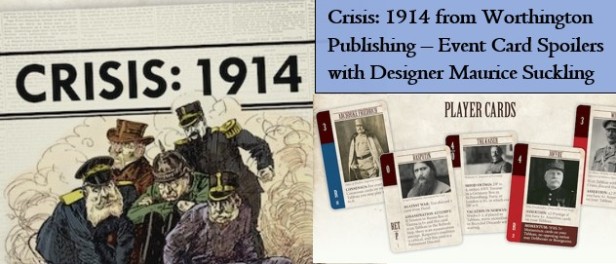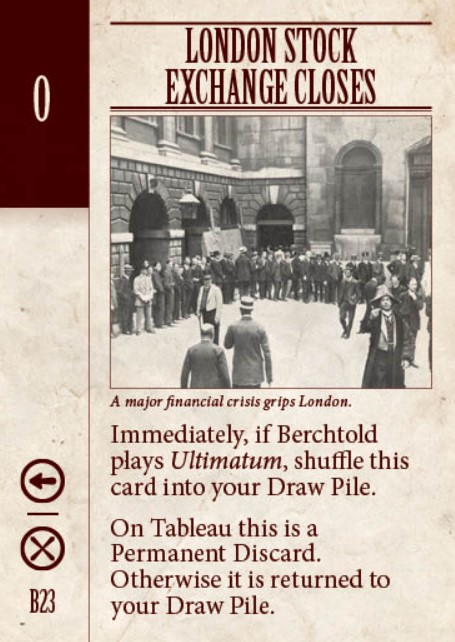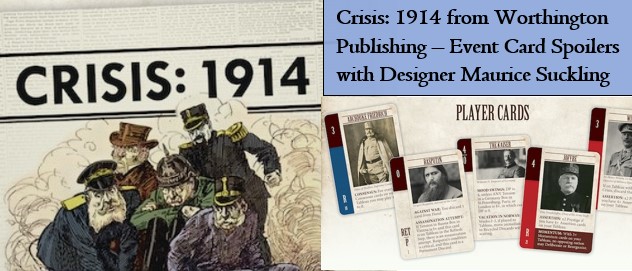We became acquainted with Maurice Suckling with his game Freeman’s Farm 1777 from Worthington Publishing in 2019 and really enjoyed the mechanics and how they all came together to create an interactive and interesting look at the Battle of Saratoga during the American Revolution. Since that time, Maurice has designed several other games that have went on to successful Kickstarter campaigns including Hidden Strike: American Revolution, Chancellorsville 1863 and 1565 Siege of Malta. He is now working on a game that is tied to the buildup of tensions that led to the outbreak of The Great War called Crisis: 1914 from Worthington Publishing, which was successfully funded on Kickstarter this past summer. He has prepared a series of Event Card Spoilers for the game and we are hosting them here on the blog. These posts will share the cards basis in history as well as how they are used in the game.

If you are interested in ordering Crisis: 1914, you can pre-order a copy for $65.00 from the Worthington Publishing website at the following link: https://www.worthingtonpublishing.com/collection/crisis-1914-pre-order-this-game-will-not-ship-until-february-2024

Card #21 – Winston Churchill – First Lord of the Admiralty
Churchill was a strong voice – indeed, the strongest in the cabinet – for military action (Otte 2014, 459, 473; Martel 2014, 360), and it was due to him, far more than to the prime minister, Asquith, that the Royal Navy mobilized on August 1st, ahead of any formal declaration of war (Otte 2014, 473-4; Ferguson 1999, 160). Churchill was responsible for impounding the two dreadnoughts destined for Constantinople on July 29th, aware of the danger they would present in the Black Sea (Tuchman 2004, 140; Fromkin 1989, 57-58; Langensiepen & Güleryüz 1995, 29).
If Tension in all Tension boxes is at 1 or higher Churchill impounds the Ottoman dreadnoughts (Tuchman 2004, 140; Fromkin 1989, 57-58; Langensiepen & Güleryüz 1995, 29). This increases the value of the Negotiations with Ottomans card in Bethmann’s deck in a 5-player game.

Card #22 – Home Rule Crisis – Politicians Focus on the Question of Irish Independence
A preeminent concern – and a domestic distraction – for British politicians during the July Crisis. Introduced in 1912, the Third Home Rule Bill raised yet again the highly contentious issue of home rule (i.e., self-governance) in Ireland and thereby reginited fears of a potential civil war (McMeekin 2013, 70-71). Like the Madame Caillaux Trial in France, the Home Rule Crisis commanded political and public attention for much of the summer; as late as July 27th, The Times deemed it “one of the greatest crises in the history of the British race” (McMeekin 2013, 250).

Card #23 – London Stock Exchange Closes – A Major Financial Crisis Grips London.
The issuance of Austria-Hungary’s ultimatum “came like a bombshell” (Bankers’ Magazine 1914, 321) and the London Stock Exchange closed on July 31st, not reopening for five months. According to Richard Roberts, the ensuing crisis “was the most severe systemic [financial] crisis London had ever experienced – even more so than 1866 or 2007-2008 – featuring the comprehensive breakdown of its financial markets” (Roberts 2013a, 5). Moreover, the ripples of its closure were felt worldwide as “more than [fifty] countries or colonies experienced bank runs and asset crashes” – all stock exchanges in the world, excluding the New Zealand Exchange, the Tokyo Stock Exchange, and the Colorado Mining Stock Exchange, were closed through early September (Roberts 2013b). These developments had an impact on British cabinet meetings and quickly generated an argument for neutrality. On July 31st, Prime Minister Asquith wrote to his close friend (and possible mistress) Venetia Stanley: “The general opinion at present – particularly strong in the City – is to keep out at all costs” (Roberts 2013a, 96).

Card #24 – 1839 Treaty of London – This Treaty, the “Scrap of Paper” Signed by Austria, Britain, France, the German Confederation, Russia, and the Netherlands, Guaranteed Belgian Neutrality.
Signed in London on April 19, 1839, the Treaty of London guaranteed the independence and neutrality of the Kingdom of Belgium nearly a decade after the Belgian Revolution of 1830-1831. It was Germany’s invasion of Belgium and violation of this treaty that spurred Britain to issue to the former its own ultimatum – and, on August 4th, officially join the war. Both moves were made at least in part out of a concern for Belgium’s close proximity to England, which had the potential to provide Germany with a strategic foothold just across the English Channel (McMeekin 2013, 73).
Nevertheless, Bethmann Hollweg was caught off guard. According to Edward Goschen, British Ambassador to Germany, the chancellor responded to the British ultimatum in disbelief, shocked that the country would go to war “just for a scrap of paper” (Raicer 2009, 15).
All good things come to an end and this is the final entry in this series. I want to thank Maurice for his effort in putting this series of Event Card Spoilers together and allowing us to host them here on the blog for our readers. This game looks to be very interesting and I think that it will become a multi-player mainstay at our table. The game is nearing finalization and should be shipping shortly.
If you missed the previous entries in the series, you can catch up on the posts to date by following the below links:
Series Introduction and General Mobilization Cards
If you are interested, we posted an interview with the designer and you can read that at the following link: https://theplayersaid.com/2023/07/12/interview-with-maurice-suckling-designer-of-crisis-1914-from-worthington-publishing-currently-on-kickstarter/
-Grant
